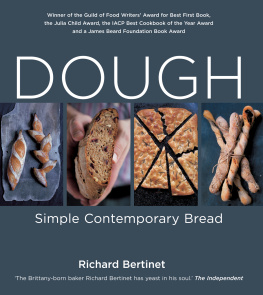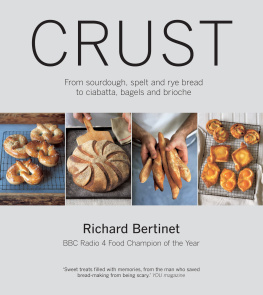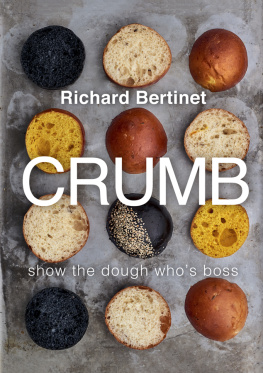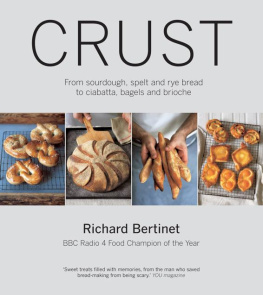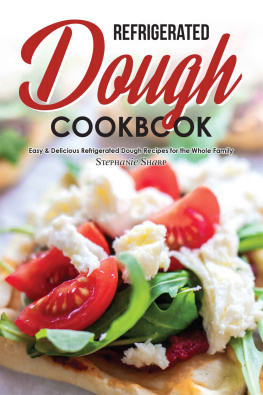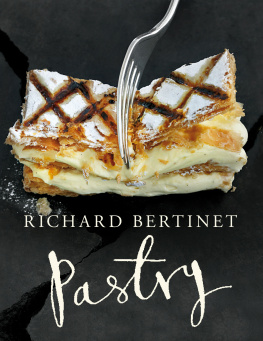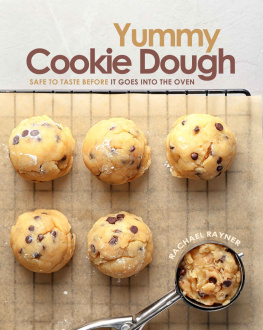Richard Bertinet - Dough
Here you can read online Richard Bertinet - Dough full text of the book (entire story) in english for free. Download pdf and epub, get meaning, cover and reviews about this ebook. year: 2018, publisher: Octopus, genre: Home and family. Description of the work, (preface) as well as reviews are available. Best literature library LitArk.com created for fans of good reading and offers a wide selection of genres:
Romance novel
Science fiction
Adventure
Detective
Science
History
Home and family
Prose
Art
Politics
Computer
Non-fiction
Religion
Business
Children
Humor
Choose a favorite category and find really read worthwhile books. Enjoy immersion in the world of imagination, feel the emotions of the characters or learn something new for yourself, make an fascinating discovery.
- Book:Dough
- Author:
- Publisher:Octopus
- Genre:
- Year:2018
- Rating:3 / 5
- Favourites:Add to favourites
- Your mark:
- 60
- 1
- 2
- 3
- 4
- 5
Dough: summary, description and annotation
We offer to read an annotation, description, summary or preface (depends on what the author of the book "Dough" wrote himself). If you haven't found the necessary information about the book — write in the comments, we will try to find it.
Dough — read online for free the complete book (whole text) full work
Below is the text of the book, divided by pages. System saving the place of the last page read, allows you to conveniently read the book "Dough" online for free, without having to search again every time where you left off. Put a bookmark, and you can go to the page where you finished reading at any time.
Font size:
Interval:
Bookmark:



Select one of the chapters from the and you will be taken to a list of all the recipes covered in that chapter.
Alternatively, jump to the to browse recipes by ingredient.
Look out for linked text (which is in blue) throughout the ebook that you can select to help you navigate between related recipes.
You can double tap images to increase their size. To return to the original view, just tap the cross in the top left-hand corner of the screen.

I have been a baker most of my life and crazy about bread since I was a kid, but it wasnt until I started teaching people how to bake simple breads at home that I really appreciated what fun, and what a sense of achievement almost everyone experiences when they realise, for the first time, what can be done with some flour, yeast, water and a little salt. Breadmaking doesnt need to be daunting or mysterious and you dont have to be born a baker. Baking is for everyone. The aim of this book is simply to get you hooked on making bread. Im not going to delve into the chemistry of breadmaking, analyse the properties of different flours, list masses of equipment or baffle you with complex techniques.
I look at it this way: do you need to know how a carburetor works to learn how to drive a car? No. Well nor do you need to immerse yourself in science to bake a wealth of wonderful breads. All the breads in this book are ones that I bake at home for my family and friends in my standard domestic oven, with my two young boys distracting me as much as they can. I teach them to the people who come to my bread classes, and I love the moment when the baking is finished and we all sit down with the breads we have made, some good cheese and ham and a glass of wine, and relax and enjoy the sense of achievement. I find that people really hate to break the spell and nothing gives me more pleasure than to hear from them that they have baked the breads again successfully at home, and really enjoyed themselves in the process.
There is another reason for writing this book the current climate of concern about the quality and safety of the food we eat, and the worry about additives, fat, sugar, salt and obesity. So much of what we eat is produced on a massive scale, with such a long and complicated chain of ingredients, suppliers and processes that many people are turning to smaller, artisan producers and farmers who can supply them with traceable food produced in simple, traditional ways, which they feel that they can have faith in. And what could be more trustworthy than your own bread, baked by your own hands in your own kitchen, using the best quality ingredients you can find? I will never forget the first time I visited a big industrial bakery in Britain, watching the loaves being mixed in minutes with the help of all kinds of improvers and additives, and churned out on a massive scale it gave me the shock of my life. I had never seen anything like it it was so alien to everything I knew about bread.
I first fell in love with bread when I was very small. My uncle had a big bakery in Paris, my mother had at one time worked behind a bakery counter, and I was fascinated by the boulangerie in my home town in Brittany. When I was on holiday from school I used to go down there and stand on tip-toes so I could peer over the counter into the bakery itself. I could see the men working in their t-shirts, covered in flour, taking the bread out of the enormous ovens. The warm, yeasty smell was so seductive. When I was 12 or 13 years old I remember being asked in school, What do you want to do when you are older? and I replied that I wanted to be a baker. I had a friend whose uncle had a bakery, and he told me that I could come and work with them early one morning. I stayed with my friend in the house above the bakery, but I couldnt sleep for excitement. By midnight I had crept down I couldnt keep away.

Baking was in my blood and, as soon as I could, I did my pre-apprenticeship, spending two weeks at school and two weeks and every weekend in the bakery. French bakeries are hard-working places but they have a magic too. There was a particular moment that I still miss, at around four oclock in the morning, when the ovens were emptied, and there was no sound, except for the newly baked bread singing. Thats what we used to call the crackling sound that big loaves make when the crust breaks as it cools down listen for yourself: when you hear it sing, thats when you know you have a good crust. In France of course, most people never bake their own bread because the tradition of buying it fresh, every day, is so strong. There is a bread for every occasion: a ficelle for breakfast, a baguette for lunch, a pain de mie for croque monsieur, a bigger pain de campagne or sourdough to put on the table or to keep and toast through the whole week. In France if there is no bread on the table at a mealtime it is a major catastrophe.
In Britain I knew there was a strong tradition of home breadmaking, but when I arrived here in 1988 I was shocked to find that very few people were bothering any more, not because there was a fantastic bakery around every corner, but because the staple diet was the sliced white loaf. There are over 200 varieties of bread available in the UK these days and we buy the equivalent of 9 million large loaves every day, but around 80% of the bread we buy is the sliced, wrapped sandwich loaf and 75% of that bread is white. Most of the commercially made bread is produced using what is known as the Chorleywood Bread Process, invented in 1961 by the British Baking Industries Research Association at Chorleywood. The process is all about producing a cheap loaf, and it uses highspeed industrial mixers which produce the dough in minutes. Because the flour isnt necessarily the highest quality, and because you need to add as much water as possible to make the bread more commercially viable, pre-mixed improvers and extra ingredients are added, such as emulsifiers, preservatives, fats, antifungal sprays and added enzymes, to make the dough softer, improve the volume and prolong shelf life. As there is no real tradition of buying bread daily in Britain, one of the first demands of any mass produced bread is that it will be able to sit on the shelf for up to a week without deteriorating fresh? thats not my definition of fresh.

Of course there is a place for commercial sliced bread to take as bait when you go fishing, or to make a bacon sandwich when youve got a hangover! but if you make your own bread, you neednt worry about these suspicious ingredients because you are in control and what do you need? Only flour, yeast, water and salt. No improvers, no enzymes, no stabilisers, emulsifiers or preservatives. And once you see the baking process in its natural, pure form then you can start asking questions to the people who make your bread commercially. Why do they need to add the contents of a chemistry set to your loaf? Skilled bakers can make bread on a large scale without bagfuls of additives, provided people are willing to pay a bit more for their bread but there lie the two big issues: price and skill. Where have all the bakers gone?
Font size:
Interval:
Bookmark:
Similar books «Dough»
Look at similar books to Dough. We have selected literature similar in name and meaning in the hope of providing readers with more options to find new, interesting, not yet read works.
Discussion, reviews of the book Dough and just readers' own opinions. Leave your comments, write what you think about the work, its meaning or the main characters. Specify what exactly you liked and what you didn't like, and why you think so.

